Interview: Justin Mark of TO KILL A MOCKINGBIRD at Fred Kavli Theatre
Richard Thomas leads the cast in the closing engagement of the national tour that began in 2022.
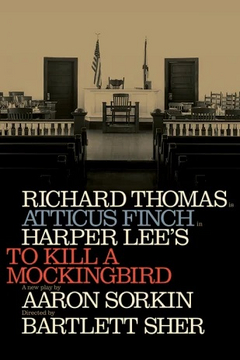
|
|
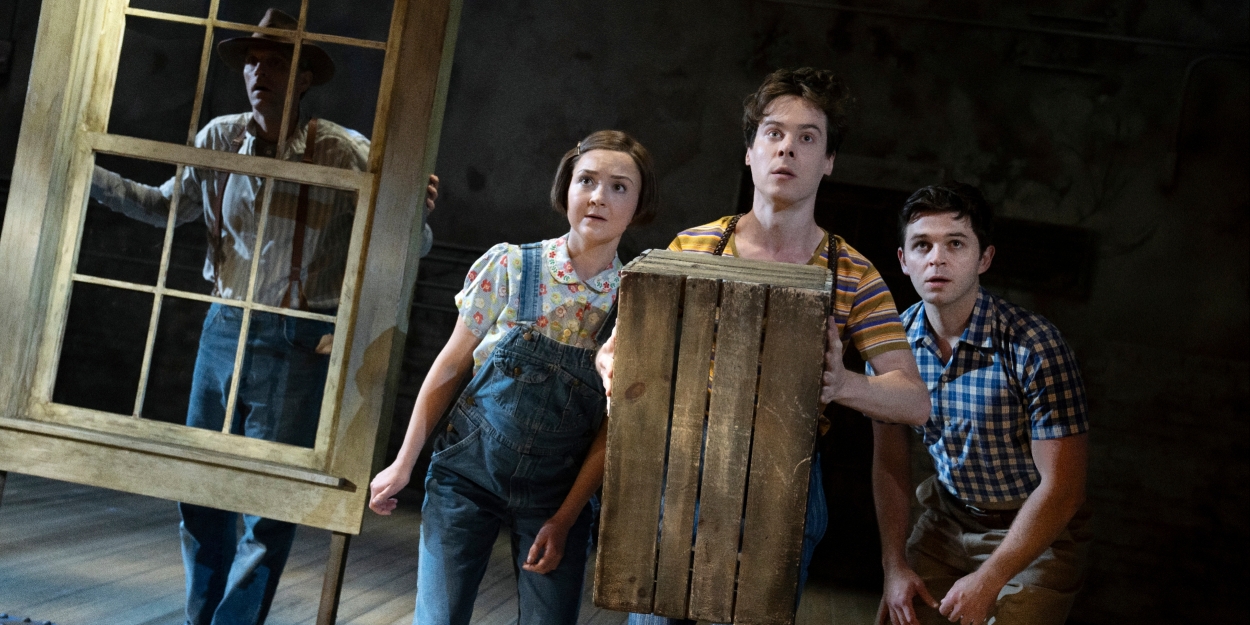
The national tour of Harper Lee's To Kill a Mockingbird comes to Thousand Oaks beginning Tuesday, June 25-30 at the Bank of American Performing Arts Center. Aaron Sorkin's new adaptation, directed by Barlett Sher, has brought raves from critics across the country, in no small part due to a highly praised performance by Richard Thomas as Atticus Finch, one of literature's towering symbols of integrity and righteousness. We had the opportunity to talk with actor Justin Mark, who plays the oldest of Finch's children, Jem.
VCOS: Welcome, Justin. Thanks for the opportunity to chat.
JUSTIN: I'm incredibly excited to be in Thousand Oaks, not only because we have a great play that we want to share, and I don't know if you know this or not, this is our final week of shows. The tour is coming to an end and it's totally bittersweet and ultimately super exciting to spend seven more days together telling this story after almost two-and-a-half years of being together. So it's going to be a pretty incredible week.
VCOS: Not many national tours go on as long as this one has. Have you been with it from the start?
JUSTIN: I have, yeah. We started rehearsal in New York City in February 2022 and I have been doing it ever since.
VCOS: So you weren't with it during the pandemic?
JUSTIN: I wasn't. No. I actually auditioned for the show and booked the job pre-pandemic when we were going to start in August 2020. But of course, that didn't happen.
VCOS: In the play, your character's age ranges from 10 to 13. How old are you now?
JUSTIN: I'm about 30.
VCOS: So you're considerably older than how the part was written. How did this change in the character come about?
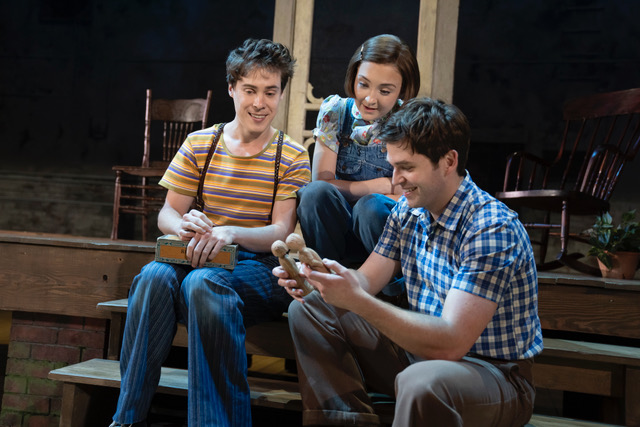
JUSTIN: The characters of Scout, Jem, and Dill act as narrators so they talk directly to the audience and kind of guide the audience through a complicated story that is being told a lot differently than the book or the movie. So those three characters play an important role, and I think it was important that they would be played by adults because they have a lot of insights because it's kind of a memory play. So the kids are sort of looking back on that summer as opposed to simply being in it the entire time. They have a level of retrospect and understanding that they wouldn't have if they were purely children. And I really like that it's very theatrical. You can't really do that in the film or the book if adults bring kids. People ask me, "How do you play a kid if you're 30 years old?" What I've found to be the most important thing is that the suspension of disbelief lies in the fact that the audience can't really tell if I'm playing a kid or an adult. It's sort of that gray area in between. I find that if it act too childlike on stage, the audience will recognize that I'm trying to be a kid and also the same if I'm trying to be too adult about it. So it's the middle ground that allows the audience to buy into it.
VCOS: It helps that Jem is very mature for his age to begin with.
JUSTIN: That's exactly right. He's the oldest of the three kids and he is at the age where he has a point of view. And he is developing opinions that are different from his father, who he idolizes. That's very difficult for Jem. That's the whole thing about the play is how do I come to terms with the fact that I disagree with Atticus, who has taught me everything I know. It's a play about so many things, but one thing is simply that it's about family and about children growing up in addition to the other things.
VCOS: True. Bartlett Sher, your director, has become known for his revivals of theatrical classics but he is usually associated with musicals. What lessons have you learned from him about To Kill a Mockingbird and specifically, how you play your character?
JUSTIN: That's a good question. He's a brilliant director and I think he realizes how amazing the writing is, too. We have a brilliant director and in Aaron Sorkin, a brilliant writer, so we have a lot to fall back on, which is nice. Bart's approach is weirdly operatic in its scope. It's a huge, sweeping play with no music, but I would call it an emotional musical in a way. The sounds that the characters make, how they talk, there's a cadence everybody has, and everybody is a little bit different. It's kind of like a symphony of actors, and I sit backstage and watch the monitor that's on in the back so I can hear what's going on on stage from my dressing room and it does sort of feel like song, even though it's just words. I don't know if that's intentional or not but I think Bart's genius lies in the fact that he can create these big, broad brushstrokes of scenes and allows the actors to live truthfully in this really specific, really thought through road map.
VCOS: It's interesting how you mention the sweeping nature of the play because on a cursory look, it seems very intimate because of the interrelationships of the characters but is it the broader themes dealt with in the story that kind of explode or expand that scope?
JUSTIN: Yes, every scene is intimate and very vulnerable. The play fluctuates between the Finch house where there's this family drama unfolding and then also the courtroom, where there's a different kind of drama unfolding. It all feels real while it's happening and I think what I mean about "broader strokes" relates to Bart's ability to work through transitions, which is amazing. The actors, me included, push the set pieces around ourselves. I push the defense table in the courtroom scene, I pull out the stairs on the porch so there are no crew members bringing everything on. It's really like a community of people telling this story very literally, setting up the chairs and tables to put this story on. There's something about that that actually creates the ability to make it feel even more real. And I think that's what I mean about Bart's genius in eliminating the façade of it being a theatrical event. The actors are bringing the tables and chairs on and these kids are talking directly to the audience.
VCOS: Do you enjoy that aspect of it, the moving of the furniture and set pieces yourselves?
JUSTIN: After 850 performances, sometimes my hips hurt, but (laughs) I do enjoy it.
VCOS: You're about the age Richard Thomas was when he was playing John-Boy in The Waltons, which also took place in the South in the 1930s. Have you spoken to him about things he learned about playing a character from this period of American history?
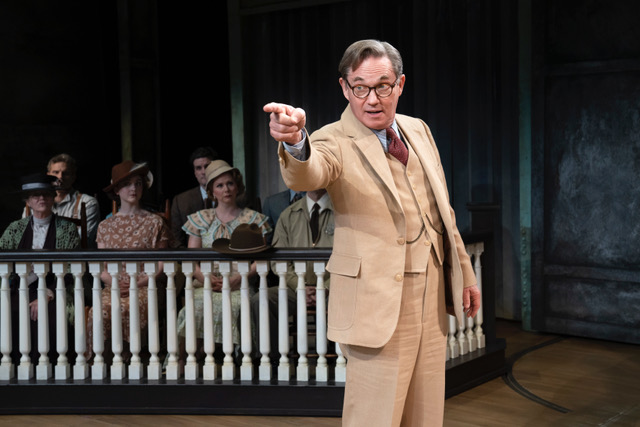
JUSTIN: I haven't talked to him specifically about that, but I do learn a lot from him. He has that kind of vibe, a wholesome kindness and a genuine interest in others. He's fascinated by lots of different things and I very much look up to him. I've seen him not only in The Waltons but on stage in New York when I first moved to the city. He's always been somebody who I can look up to. The most I've learned has been not from asking him but from watching him. He's not only a great actor but a terrific person and it's been real gift to be on this journey with him for the last two years.
VCOS: Reliving the 1930s, as you are doing, what has surprised you the most about that period, things that you had difficulty wrapping your head around?
JUSTIN: Not only was this the Jim Crow South but it's also the Great Depression too. And that's been really interesting to learn more about, and what it was really like for someone who is a successful lawyer who we put on this pedestal, but still, the Finch household is pretty poor too. Nobody has any money, even at Atticus' level, so to think about Bob and Mayella Ewell and how poor they are and how poor Tom Robinson is, and to try and understand what life was like on top of all the racial injustice going on, it was really a hard time for anyone, everybody from farmers to lawyers. It was just a difficult time to live in a small town in Alabama. I didn't know anything about that so that's been interesting to explore.
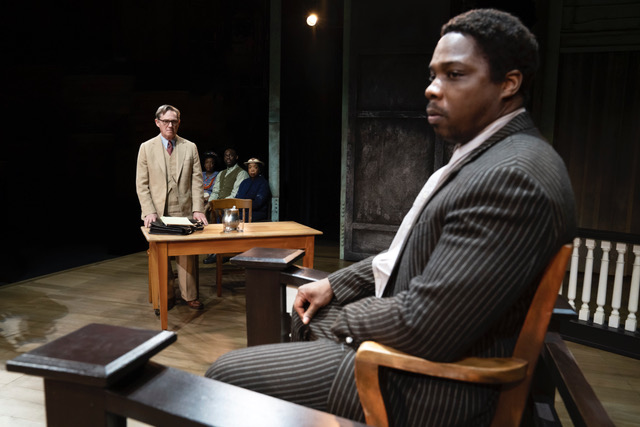
VCOS: And especially without all the electronic devices that we enjoy now, do you imagine or think about what a boy like Jem did and how he lived without a cellphone, without a computer, without television, and even without air conditioning?
JUSTIN: I will say that summer has always been my favorite time of the year and as a child, I barely had shoes on and was running around outside every day, so I did have some good experiences to draw from that. I came of age right before social media took over so I was able to have this full-on "kid experience" and that is fun. We do get to run around and have a good time as kids on stage every night. And as silly as that seems sometimes, it is kind of fun to pretend not to know a lot about the world and ask questions and absorb and learn. I remember having that experience.
VCOS: In this day and age, where censorship is returning and there is book banning in the South and things are becoming controversial that you didn't think was controversial, how do you account for the play's universal acclaim wherever it goes?
JUSTIN: I think we can relate to this show in ways that we can't even articulate. It's really a powerful piece of theatre but it's also an event. You know when you buy a ticket to this play that you are going to be entertained but you also know that something else is going to happen. And I think it's that something else, that fascination with our past as Americans is what we are interested in and how we've grown and learned from that time. I think that's what's bringing people to the theater. It's amazing that so many people have come out because it's a choice to come to this show. You know it's going to be hard; there's work going on here and people are going through this on stage every single night and I think to create an artistic space where Americans can come together and work through that together is pretty cool.
VCOS: Have you encountered any audiences that showed any kind objection to the subject matter?
JUSTIN: I wouldn't use the word "objection" but I think the responses have been all over the map. It's been very exciting at times. Last week, Bob Ewell, who is this very despicable character, is having a confrontation with the judge and there is this quiet moment on stage after the confrontation and someone from the audience just yelled out, "Arrest him!"
VCOS: Lock him up!
JUSTIN: Yeah, it was amazing. This person felt like he had no choice but to yell out. Now I'm not encouraging people to do this but I just thought it was cool. I don't think there has been any objection to the subject matter but this indicates some pretty intense engagement.
VCOS: Last question. If you could ask Harper Lee anything about your character, what would it be?
JUSTIN: Hmm. I would ask her about Jem's relationship with his mother. In the story, his mom died when he was very young and I don't know a lot about that. Harper Lee didn't talk much in the book about that. It's so clear what his relationship with his father is but I'd love to know her thoughts on what his relationship with his mother was.
To Kill a Mockingbird plays at the Fred Kavli Theatre in Thousand Oaks from June 25-30. For tickets, visit www.ticketmaster.com.
Comments
Videos





